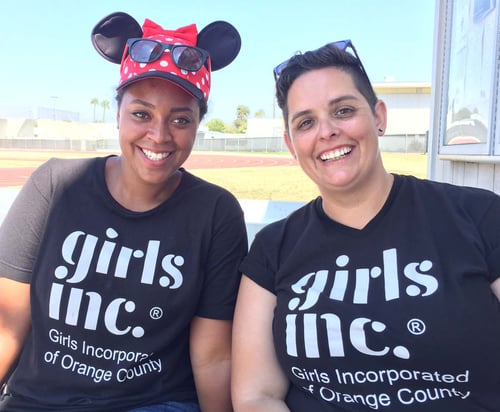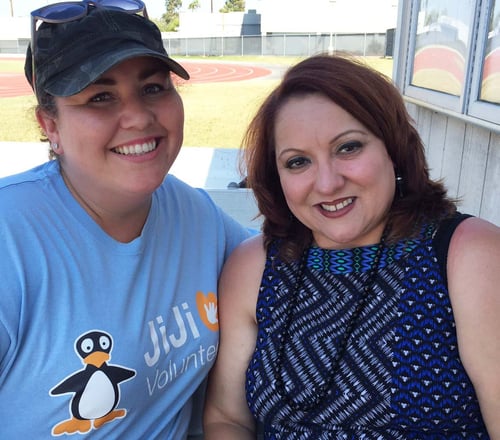
Like many other parents I have spent countless hours worrying about my children’s education and whether I was setting them up for success in life. My daughters, now 22 and 19 and both attending Art Center College of Design in Pasadena, have been given as many opportunities for a strong educational foundation as any American middle-class parent can hope to provide. They attended public schools in well-funded districts where teachers and administrators are often surrounded by supportive parents. They had the chance to join soccer, dance and swim teams, learn to play the piano and be a part of theater productions. So with this virtually picture perfect scenario, why did I lose sleep over their education?
For both of my daughters learning math was a struggle. For my youngest, Angela, it became so difficult she would break down in tears, put her hands on her head and say that she didn’t “get math” because she was “a different species” or even “stupid.” Over time, I watched a girl who at age 3 could solve puzzles and create Lego structures that children twice her age could not do, rapidly lose self-confidence in her ability to excel not only in math, but in school in general. By 4th grade, as she continued to be told not to doodle on her math worksheets, she started to fail every test she was given.
Growing up in Brazil with Chinese-Taiwanese parents, I never heard people say they that they didn’t “get math." I would hear, “I don’t know how to calculate this” or, “I don’t understand this problem.” To me, both sentences imply a temporary state—it even seems to solicit help for further learning or investigation. In American culture, however, the ability to solve mathematical problems seems to be considered a talent, and the lack thereof is often met with empathy. Yet the words, “I don’t get reading” would probably never be uttered at a dinner party.
Whatever caused us to be so complacent about math, also allowed us to perpetuate a damaging stereotype: that boys are just naturally better at math than girls. This has been a hot topic in education for some time and research continues to show that the majority of the achievement gap in math between boys and girls (and its subsequent STEM-related career choice gap) traces back to attitudes and patterns of behavior displayed by the children’s home and school environments.
Studies show girls are less confident than boys in their math abilities, which is a predictor of math performance and career choice.
Thankfully, there are many organizations doing something about this. At MIND Research Institute, where my colleagues and I are on a mission to “ensure that all students are mathematically equipped to solve the world’s most challenging problems,” we are partnering with incredible organizations to revolutionize math education and the stigma that surrounds it. This summer, Chevron Corporation has provided generous support to enable us to partner with the Boys & Girls Club of Santa Ana and Girls, Inc. of Orange County to create and facilitate engaging activities focused on deep mathematical problem solving.
Beth Payne, STEM Coordinator for Girls, Inc. of Orange County, shared with me that she loves what she does and especially what we have done together with this year’s camp at Orange Coast College campus because the girls are discovering that they love science and math without even realizing that they're learning. "Eureka! is our summer program targeted to 7th and 8th graders," says Payne. "Girls around this age are trying to figure out if they are the ‘smart ones’ or the ‘popular ones.’ We want to show them that they are all smart and that they have a world full of opportunities ahead of them."

Miranda Allen (left), a senior at Duke University majoring in Biology, was selected as one of Girls Inc’s Scholars this year and has been helping with Eureka! Middle School program alongside Beth Payne, STEM Coordinator for Girls, Inc.
Lucy Santana-Ornelas, CEO of Girls, Inc. of Orange County, added that in her 18 years with the organization, she has seen many of their graduates pursue careers in STEM and then come back to volunteer and mentor new girls. “Look at them now,” she said, pointing towards the group engrossed in their activities. “They’re challenging each other, making mistakes and persevering until they find a solution. And they’re having fun! The confidence that these girls are building right now will carry them through many challenges in life. This is why I believe in what we do.”

Maria Cervantes (left) of MIND Research Institute and Lucy Santana-Ornelas, Girls, Inc. CEO, taking a well-deserved break at this year’s STEM camp.
As I left Girls, Inc.’s summer STEM camp I felt proud of what we do at MIND and the partnerships we’ve built to increase our impact. But I also felt a little sad that my daughters didn’t have such transformational experiences inside and outside of the classroom. Fortunately, like most mothers, I haven’t given up. Last summer, both of them volunteered to work as counselors at our pilot math camp in Orange, CA. I watched my daughters encourage young campers to see the math that’s involved in activities like archery, zip lining, art and even dance. All the parents out there know exactly how I felt watching my daughters not only “get math” but get excited about math. This is what I want for all the daughters across the country.

Angela Wu Martin (left) and Christina Wu Martin (right) volunteering at last year’s pilot math camp in Orange, CA.
Mind Research Institute is partnering with Million Women Mentors to support the engagement of one million Science, Technology, Engineering and Math (STEM) mentors (male and female) to increase the interest and confidence of girls and women to persist and succeed in STEM programs and careers.
Comment